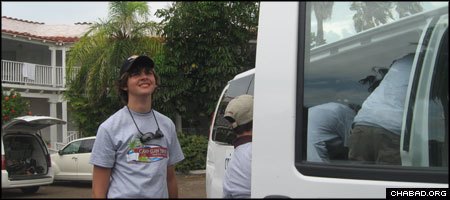Cars stacked up in a slow-moving procession across the Queen Isabella Bridge as a strengthening Hurricane Dolly inched ever closer to South Padre Island, Texas. Among the exodus of residents and tourists heading inland were the 40 campers and staff of Lubavitch Camp Gan Israel.
But Chabad Rabbi Asher Hecht, director of the three-year-old Jewish overnight camp, was quick to emphasize that he did not consider the move an evacuation. Preferring instead to characterize the five-hour trip to S. Antonio as an “extended road trip,” the rabbi said the goal was to maintain camp operations during the three-day stay.
“We’re relocating to a Days Inn,” said Hecht. “We’ve also reached out to the local Jewish Federation and the local Jewish Community Center. In addition, Chabad-Lubavitch of South Texas is prepared to help us with whatever we need. We’re keeping this camp going, and have a full schedule of activities for our campers.”
Hecht’s staff and campers headed out yesterday morning, and were some of the first people off the island. Throughout the day, a steady stream of vehicles could be seen heading one way across the bridge on State Highway 100, which the Texas Department of Transportation closed at 10 p.m.
As the campers packed up, workers boarded up the windows in Gan Israel’s rented location, a historic 1926 building in the midst of a renovated retreat center. The children paused for one last group picture on the sand before leaving the beach.
Municipal officials implored the public to make their final preparations in advance of Dolly, which became a Category 1 hurricane yesterday afternoon.
“The island community is urged to complete any necessary business on the island as early as possible,” said Mayor Robert N. Pinkerton, Jr. “We encourage people to be on one side of the bridge by 6 p.m. We also urge the community to remain indoors after sundown today.”
Landfall Nears

At 6 a.m. local time today, Dolly was churning in the Gulf of Mexico 51 miles from the Brownsville International Airport. A National Weather Service bulletin said that the storm packed sustained winds of 85 m.p.h., and moving northwest at just under 8 m.p.h. Hurricane warnings extended from Brownsville to Corpus Christi in Texas, and from Rio S. Fernando, Mexico, to the country’s border with the United States. Forecasts did not rule out the possibility of the hurricane strengthening to Category 2 stage before making landfall early in the afternoon.
Maj. Jose Rivera of the Texas Army National Guard told The Associated Press that troops were preparing at armories in Houston, Austin and S. Antonio after Gov. Rick Perry activated 1,200 soldiers to help.
Among the dangers associated with the storm are a predicted storm surge of four to six feet above high tide, battering waves, beach erosion, isolated rainfall amounts of 15 inches, inland flooding, and scattered tornadoes across the Rio Grande Valley.
“We told the kids that there was going to be some uncomfortable weather conditions,” said Hecht. “They’re taking the move in stride, and are actually excited about the trip.”
Among those who chose to stay on the island were most members of the small Israeli community, said local hotel operator Zeev Tafel.
“We’ve been here before,” he said yesterday. “I’ll stay in my house and wait it out.”
Rabbi Yossi Marrus, program director of Chabad-Lubavitch of South Texas, said that he didn’t expect many people from the coastal Jewish community to evacuate. In the 10 years he’s lived in S. Antonio, he said, a handful of larger hurricanes drove people inland.
Marrus, who operates his own Camp Gan Israel day camp for 115 campers, added that he and his community would offer any assistance necessary to people displaced because of the hurricane.
Tafel said that while last-minute beachgoers were catching in their last waves and sun before rain and dangerous surf set in, vacationers with reservations at his hotel later this week cancelled their reservations.
But although he would experience a momentary economic hit from the hurricane, Tafel said that he was worried about the Jewish camp, which will incur increased expenses because of their short-term move.
“They’ll need all the monetary help they can get,” he said.
Hecht urged people to donate online by visiting the camp’s Web site at www.cgispi.com/donate.




Start a Discussion